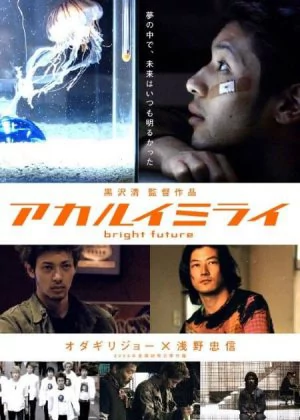Bright Future
Kiyoshi Kurosawa is one of the few Japanese directors who has managed to remain in the public eye after the turn of the century boom subsided. He's an interesting director for sure, but I've never fully gelled with his style. There are only two films in his pretty vast oeuvre I consider personal favorites, Bright Future [Akarui Mirai] is one of them. I was a little hesitant to revisit the film, as it was made during the rise of DV cinema (and many of those haven't kept too well), but that worry turned out to be for naught. It was easy enough to fall in love with this film all over again.
![screencap of Bright Future [Akarui Mirai]](/thumbs/img/articles/1200xauto/bright-future-1.webp)
Kiyoshi Kurosawa has taken on many forms during his career, but he's always been a more arthouse-leaning director, even if he got famous with his horror work. Films like Cure and Pulse are cornerstones of the Asian suspense wave, though I can't call myself a big fan. I vastly prefer Kurosawa's crime cinema and his grittier dramas, of which Bright Future might be his most recognized one. Mostly a lucky coincidence I guess, as distributors were going after every Japanese film with any kind of commercial appeal back then, nowadays a film like this would have no chance of landing an international distribution deal.
Bright Future is both a child of its time and a very singular work. The cast, the inaccessible characters, the grittier foundation, and the tranquil pacing are clear indicators of early-to-mid-00s Japanese drama. Kurosawa adds enough touches of his own to set it apart from other films in this niche. It's not a film that comes with a large built-in audience, though the director's reputation may have given the film a little extra leeway. It's funny how these things work and I'll probably never be able to figure out how and why some films make it while others don't (apart from attributing it to a portion of sheer luck). In this case, I'm just happy that Bright Future somehow made the cut.
Yuji is a young 20-something guy who lacks direction. He works in a small factory, but he has nothing substantial to live for and he has no clue what he wants out of life. He looks up to Mamoru, one of his co-workers, who seems to live by his own rules. The two get better acquainted and start to hang out together. When their boss tries to weasel into their friendship, Mamoru feels that his time in the factory is up. He leaves his precious jellyfish to Yuji and assures him that he is ready to face life without him. Yuji feels strengthened by Mamoru's confidence, but he'll soon come to face some major hurdles that will throw him off of his path.
![screencap of Bright Future [Akarui Mirai]](/thumbs/img/articles/1200xauto/bright-future-2.webp)
Kurosawa isn't really known for paying too much attention to the styling of his films, so I was pleasantly surprised about how good Bright Future looked. Not in the least because I remembered it to be a typical grungy DV project. The HD cleanup definitely helped, but the framing and the use of color are also very pointed and deliberate. The lower-quality source material is still very obvious in the darker scenes, but Kurosawa made very good use of the DV capabilities to add a bit of extra life and vibrancy to certain scenes. Sometimes things are actually better than you remembered them to be.
The soundtrack deserves a mention too. Usually, films like these come with a more traditional score, even grittier dramas. It's a little difficult to describe the style Kurosawa went for, it is typical film score material that probably wouldn't work that well outside of the context of the film, but it adds a unique flavor and that's all that really matters. Combined with the strong cinematography, this is probably one of Kurosawa's most refined and stylized films, which no doubt played an important part in my continued appreciation of the film.
When two powerhouses like Tadanobu Asano and Joe Odagiri team up you know the casting won't be a point of contention. They were both still in the early stages of their career, but they didn't need very long to reach their peak form. Odagiri is superb in the lead, and Asano is equally captivating, though his role is considerably smaller. The secondary cast is stacked too, with actors like Takashi Sasano, Tatsuya Fuji, and Ryo Kase all appearing in very notable parts. Japan really had an incredible wealth of acting talent back then, which is always a big plus when revisiting these turn-of-the-millennium films.
![screencap of Bright Future [Akarui Mirai]](/thumbs/img/articles/1200xauto/bright-future-3.webp)
Once the film is finished, you may have a little trouble reconstructing the actual plot. While the first third or so is pretty straightforward, featuring a more or less classic build-up, the rest appears to be rather haphazard. Things move along pretty quickly, with some crucial events being entirely skipped or just alluded to ever so briefly. If you're married to plot-driven narratives this will be an issue, but since Kurosawa is clearly trying to paint a character portrait here, the more snapshot-like structure really benefits Odagiri's growth as a character. I believe Kurosawa made the right call here, but your mileage may vary.
Bright Future is a film that has something to offer in just about every department. The characters are interesting, the performances are perfect, the narrative structure feels fresh and the presentation is stylish without being overly detracting. It's a shame Kurosawa didn't explore this style more in detail later on in his career, especially since he's one of the few remaining Japanese directors with a strong international presence. But that just adds to the unique appeal of Bright Future. If you love a gritty Japanese drama and you haven't seen it yet, make this film a priority.
